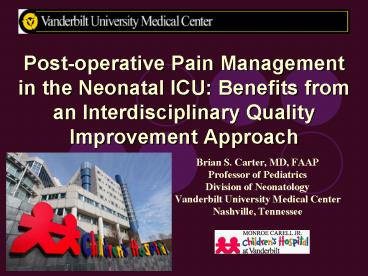Postoperative Pain Management in the Neonatal ICU: Benefits from an Interdisciplinary Quality Improv - PowerPoint PPT Presentation
1 / 15
Title:
Postoperative Pain Management in the Neonatal ICU: Benefits from an Interdisciplinary Quality Improv
Description:
Post-operative Pain Management in the Neonatal ICU: Benefits from an ... Division of Neonatology. Vanderbilt University Medical Center. Nashville, Tennessee ... – PowerPoint PPT presentation
Number of Views:464
Avg rating:3.0/5.0
Title: Postoperative Pain Management in the Neonatal ICU: Benefits from an Interdisciplinary Quality Improv
1
Post-operative Pain Management in the Neonatal
ICU Benefits from an Interdisciplinary Quality
Improvement Approach
- Brian S. Carter, MD, FAAP
- Professor of Pediatrics
- Division of Neonatology
- Vanderbilt University Medical Center
- Nashville, Tennessee
2
Background Problem
- Post-operative pain management in the NICU is
difficult and inconsistent. - Unmanaged pain has negative effects on
- hospital LOS
- short-term physiology well-being, and
- it may negatively impact patient neurobehavioral
state and long-term outcome. - Project designed to study the impact of an
interdisciplinary team approach to improving
post-op pain management in a large NICU.
3
Analysis of Cause
- Chart audit of 50 post-op NICU patients
- Needs for improved pain assessment and management
revealed. Causes included - Nature of surgery
- Time to 1st dosing of post-op analgesia
- Type of analgesia used
- Pain scale scores responses to medication
- Change would require
- Staff education
- Standard assessment
- Standardized physician order entry
- Reference table of expected duration of pain
based upon the nature of the procedure.
4
Ishikawa fish-bone cause/effect diagram
5
Errors in Pain Management
J Pain Symptom Mgmt July 2004 2847-58
6
Pain happens in a social context, must be
communicated, and then acted upon.
Kenneth Craig, et al. Challenges of judging pain
in vulnerable infants. Clin Perinatol 29
(2002)445-457.
7
Strategy for change
- Change was implemented through 3 repetitive PDSA
cycles - Educational interventions
- Development of a computerized analgesia physician
order-entry set - Standardized table of expected duration of pain
following 17 common surgical procedures - Each cycle of analysis looked at 50 post-op NICU
patients. - An interdisciplinary NICU pain management team
(physicians, nurses, educators, pharmacist) met
regularly over a 3 year period guiding change. - Results were disseminated through
- Unit-based education
- New staff orientation
- Physician house officer and staff education
conferences - Incorporation of the protocol into an NICU Manual
- An increased presence of team members on the unit
for consultation.
8
Measured improvement
- Change was measured during repeated PDSA
cycles to examine - Improvement in medication use
- Reduced time until 1st analgesic dosing
- Improved documentation of pain assessment using
the Neonatal-Pain, Agitation, and Sedation Score
(N-PASS).
9
(No Transcript)
10
VCH Post-op Pain Management
11
(No Transcript)
12
What about sedation in ventilated newborns?
- Do not make it routine
- Opioids are probably safer than benzos
- Always assess causes for agitation dont assume
that its due to pain
13
Effects of changes
- Pain control improved by measures of the N-PASS
- Staff had less angst about delayed or
inappropriate pain management - Physicians reported ease of ordering medications
- Use of non-opioid analgesics improved
- Inappropriate use of anxiolytics declined
- Efforts continue to address ongoing pain
management beyond surgical conditions - NICU procedural pain is addressed more
consistently - General use of opioid sedation for ventilated
patients is reduced - The pain management team continues to meet and is
currently evaluating - total opioid dose exposure
- use of methadone
- alternative protocols for laparoscopic procedures
- impact of pain management upon patients time on
assisted ventilation - Resistance to change was largely limited to
surgeons early in the process, ongoing education
continues to address new staff.
14
Lessons Learnt
- The value of the interdisciplinary team,
unit-based staff involvement, and a continuous
process that looks carefully at data cannot be
overstated. - Such efforts require a time commitment and also
likely financial support. - In our experience, the work was accelerated when
one investigator received extramural grant
support.
15
Message for others
- Pain can be better managed in the NICU
- The quality performance improvement methods
described are applicable to other units of
patient care.































